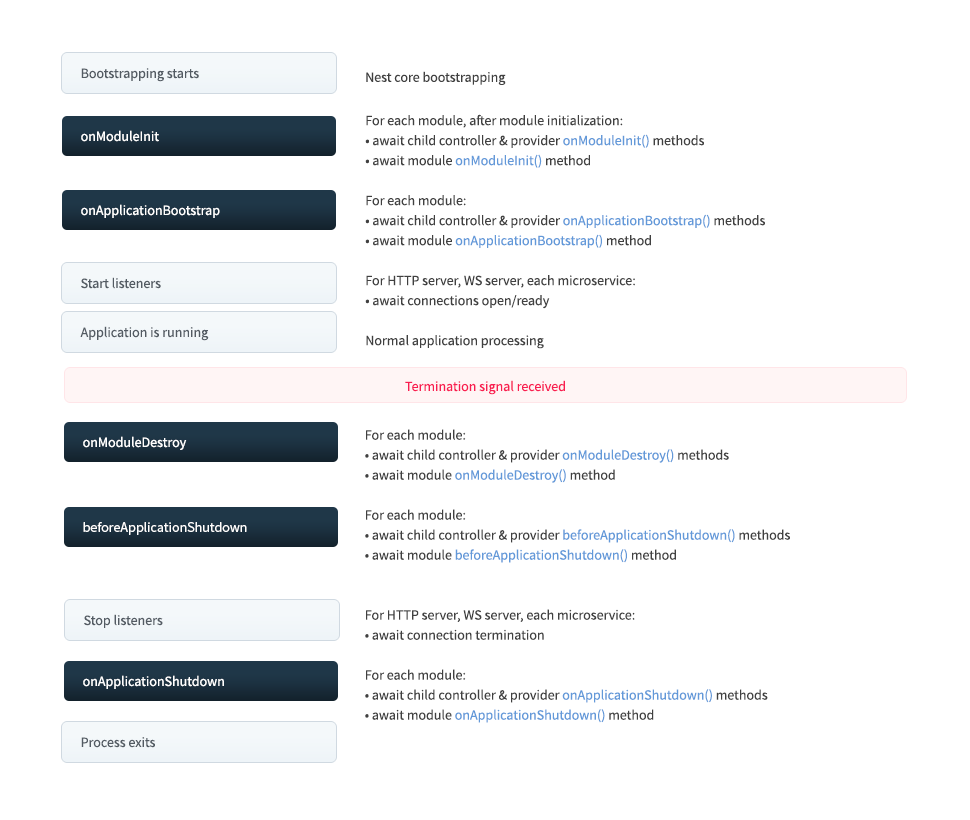Lifecycle Events
A Nest application, as well as every application element, has a lifecycle managed by Nest. Nest provides lifecycle hooks that give visibility into key lifecycle events, and the ability to act (run registered code on your modules, providers or controllers) when they occur.
Lifecycle sequence
The following diagram depicts the sequence of key application lifecycle events, from the time the application is bootstrapped until the node process exits. We can divide the overall lifecycle into three phases: initializing, running and terminating. Using this lifecycle, you can plan for appropriate initialization of modules and services, manage active connections, and gracefully shutdown your application when it receives a termination signal.

Lifecycle events
Lifecycle events happen during application bootstrapping and shutdown. Nest calls registered lifecycle hook methods on modules, providers and controllers at each of the following lifecycle events (shutdown hooks need to be enabled first, as described below). As shown in the diagram above, Nest also calls the appropriate underlying methods to begin listening for connections, and to stop listening for connections.
In the following table, onModuleDestroy, beforeApplicationShutdown and onApplicationShutdown are only triggered if you explicitly call app.close() or if the process receives a special system signal (such as SIGTERM) and you have correctly called enableShutdownHooks at application bootstrap (see below Application shutdown part).
| Lifecycle hook method | Lifecycle event triggering the hook method call |
|---|---|
onModuleInit() | Called once the host module's dependencies have been resolved. |
onApplicationBootstrap() | Called once all modules have been initialized, but before listening for connections. |
onModuleDestroy()* | Called after a termination signal (e.g., SIGTERM) has been received. |
beforeApplicationShutdown()* | Called after all onModuleDestroy() handlers have completed (Promises resolved or rejected);once complete (Promises resolved or rejected), all existing connections will be closed ( app.close() called). |
onApplicationShutdown()* | Called after connections close (app.close() resolves). |
* For these events, if you're not calling app.close() explicitly, you must opt-in to make them work with system signals such as SIGTERM. See Application shutdown below.
warning Warning The lifecycle hooks listed above are not triggered for request-scoped classes. Request-scoped classes are not tied to the application lifecycle and their lifespan is unpredictable. They are exclusively created for each request and automatically garbage-collected after the response is sent.
info Hint Execution order of
onModuleInit()andonApplicationBootstrap()directly depends on the order of module imports, awaiting the previous hook.
Usage
Each lifecycle hook is represented by an interface. Interfaces are technically optional because they do not exist after TypeScript compilation. Nonetheless, it's good practice to use them in order to benefit from strong typing and editor tooling. To register a lifecycle hook, implement the appropriate interface. For example, to register a method to be called during module initialization on a particular class (e.g., Controller, Provider or Module), implement the OnModuleInit interface by supplying an onModuleInit() method, as shown below:
@@filename()
import { Injectable, OnModuleInit } from '@nestjs/common';
@Injectable()
export class UsersService implements OnModuleInit {
onModuleInit() {
console.log(`The module has been initialized.`);
}
}
@@switch
import { Injectable } from '@nestjs/common';
@Injectable()
export class UsersService {
onModuleInit() {
console.log(`The module has been initialized.`);
}
}
Asynchronous initialization
Both the OnModuleInit and OnApplicationBootstrap hooks allow you to defer the application initialization process (return a Promise or mark the method as async and await an asynchronous method completion in the method body).
@@filename()
async onModuleInit(): Promise<void> {
await this.fetch();
}
@@switch
async onModuleInit() {
await this.fetch();
}
Application shutdown
The onModuleDestroy(), beforeApplicationShutdown() and onApplicationShutdown() hooks are called in the terminating phase (in response to an explicit call to app.close() or upon receipt of system signals such as SIGTERM if opted-in). This feature is often used with Kubernetes to manage containers' lifecycles, by Heroku for dynos or similar services.
Shutdown hook listeners consume system resources, so they are disabled by default. To use shutdown hooks, you must enable listeners by calling enableShutdownHooks():
import { NestFactory } from '@nestjs/core';
import { AppModule } from './app.module';
async function bootstrap() {
const app = await NestFactory.create(AppModule);
// Starts listening for shutdown hooks
app.enableShutdownHooks();
await app.listen(3000);
}
bootstrap();
warning warning Due to inherent platform limitations, NestJS has limited support for application shutdown hooks on Windows. You can expect
SIGINTto work, as well asSIGBREAKand to some extentSIGHUP- read more. HoweverSIGTERMwill never work on Windows because killing a process in the task manager is unconditional, "i.e., there's no way for an application to detect or prevent it". Here's some relevant documentation from libuv to learn more about howSIGINT,SIGBREAKand others are handled on Windows. Also, see Node.js documentation of Process Signal Events
info Info
enableShutdownHooksconsumes memory by starting listeners. In cases where you are running multiple Nest apps in a single Node process (e.g., when running parallel tests with Jest), Node may complain about excessive listener processes. For this reason,enableShutdownHooksis not enabled by default. Be aware of this condition when you are running multiple instances in a single Node process.
When the application receives a termination signal it will call any registered onModuleDestroy(), beforeApplicationShutdown(), then onApplicationShutdown() methods (in the sequence described above) with the corresponding signal as the first parameter. If a registered function awaits an asynchronous call (returns a promise), Nest will not continue in the sequence until the promise is resolved or rejected.
@@filename()
@Injectable()
class UsersService implements OnApplicationShutdown {
onApplicationShutdown(signal: string) {
console.log(signal); // e.g. "SIGINT"
}
}
@@switch
@Injectable()
class UsersService implements OnApplicationShutdown {
onApplicationShutdown(signal) {
console.log(signal); // e.g. "SIGINT"
}
}
info Info Calling
app.close()doesn't terminate the Node process but only triggers theonModuleDestroy()andonApplicationShutdown()hooks, so if there are some intervals, long-running background tasks, etc. the process won't be automatically terminated.